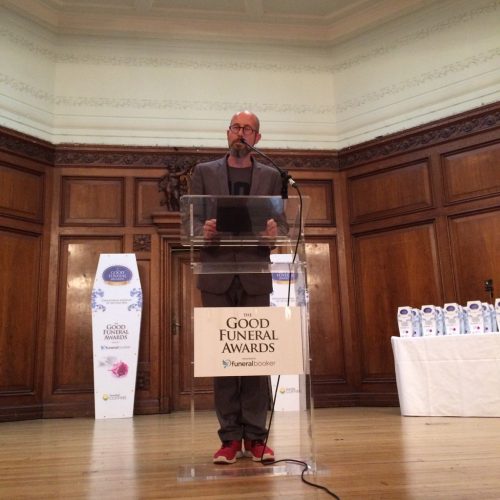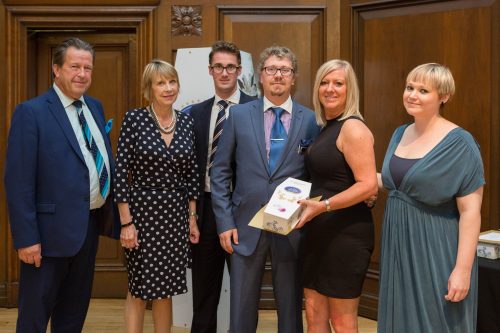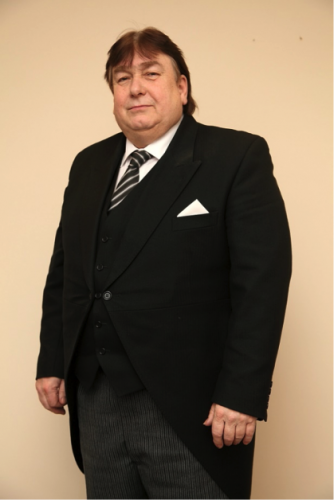
Ru’s opening words to the assembled guests struck a chord with many who were there, so we thought we’d put them on the blog for the whole world to read. Over to you Rupert.
“Welcome everyone to the Good Funeral Awards 2016!
It started off, as so many good things do, in a sweaty basement in Bournemouth, and has grown into this glamorous Metropolitan lunchtime bunfight.
My name is Ru Callender and I should be standing here with my wife, Claire – sadly, she’s got flu. Together, we run The Green Funeral Company in Devon, and we used to be the Enfants Terrible of the undertaking world. Self taught, stubborn, scruffy, we still use our family Volvo instead of a hearse – but as we’ve been doing it for 17 years, we’re probably just terrible…
Today is a genuinely unusual mélange of the alternative and the conventional funeral world, and it has probably taken longer than the Good Friday agreement took to get everyone in the same room.
You are here because someone thinks you’re great. Let that sink in.
Even if you asked them to.
This gathering is largely due to Charles Cowling and crew of the Good Funeral Guide, and also to the original renegade masters, the Natural Death Centre, both of whose organisations dared to believe that ordinary people could deal with the gritty detail of death, the truth about what happens to our bodies, that a deep, internal understanding of death is part of our birthright, part and parcel of being human.
And what they did – brace yourself, maybe have a glug of wine to steady yourself here, was to treat the public as adults, to include them in a conversation about the one thing that will happen to each and every one of us.
They presumed, as we all should, that people can handle more than the protective narrative that is fed to them.
They were right.
It was thought wildly radical then, now it just seems honest and transparent.
I said funeral world because I refuse to use the word industry. Making computers is an industry. Fashion is an industry. Even getting fit is an industry. I don’t decry industry. It’s necessary.
But death is a true mystery, and working with it should be a vocation, a real calling, and if you’re not meant to be here, if ego, or an understandable search for meaning in your life has misled you here, then death has a way of calling your bluff. You are either initiated, in or out.
This work, the real work of dealing with death and loss is not glamorous, however closely it nearly rhymes with sex, however interesting it makes us appear to those who unfortunately have to work in jobs they hate to pay the bills, and that matter little.
This work, done properly, is incredibly stressful.
It’s exhausting, frightening, physically, emotionally and existentially challenging, but it is also deeply, deeply rewarding.
Burn out is a real risk, or worse, an unconscious hardening of your outer emotional skin – these are the risks you face depending on whether you fully engage with it or not.
Breakdown or bravado. Truly a metaphor for our times.
So, if you work with death – florist, celebrant, undertaker or chaplain, particularly if you are new to it, you really have to let it in.
Go deeper.
Feel it. Fear it. Don’t pretend to love it , because the only thing worse than death is not death – and then, if you can, let it go.
This world is also open to all.
Undertaking is completely unregulated, and should remain so in my opinion, not just because no amount of qualifications can teach you what to say to the mother of a dead child, that is an instinctive language that rises unbidden from the heart, but also because we are all amateurs when staring into the abyss, all professionals when faced with a dead body.
And they are OUR dead, yours and mine. We are all funeral directors eventually.
It is a shared mystery and your guess as to what it means, and your actions as to what to do are as valid as mine, or the Church, or the Humanists.
Nobody knows for sure.
The mechanics of what needs to be done are easy, I promise. Keep bodies cold. Put them in a suitable receptacle. Carry them, bury or burn them.
The rest, the words, the rituals, the how we do this, you KNOW, deep down what is right for you. You know.
But here I am, bringing you all down at a funeral award convention – I should get a prize for that!
But just indulge me one last time before we start bringing on the champs, and this celebration of the real change that has happened gets underway –
Euphemisms.
They cover the kitchen floor of bereavement like a spilled cat litter tray.
They protect no-one, they fool no-one, they confuse children. They are well meaning, but they are wrong.
I’m only going to take on one here, and I apologise if anyone has to amend their speech or their website as a result.
Loved ones.
Not everyone is loved, some because they have led sad, lonely lives, others because they did bad things.
They die too. They need funerals and their families are broken, and the depth of their pain makes the phrase ‘Loved one’ seem like a jeer.
Just saying.
So call them the dead, the dead one, the dead person, anything other than ‘loved one’. Call them by their name!
I know it’s awkward, but it will spare you the look of contempt you get when you say it to the wrong person.
Lecture over.”



